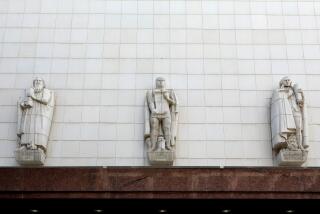Survey About Area Judges Criticized for Lack of Detail
- Share via
A new survey of lawyers that pronounces all Ventura County judges qualified to do their jobs is drawing fire from some attorneys who say the rankings are too watered down to be meaningful.
Eight judges were called qualified, while 19 judges and two court commissioners were called highly qualified in the biennial survey conducted by the Ventura County Bar Assn.
No judge was rated unqualified--the only other category.
“Hell, everybody on the bench is qualified,” groused defense attorney James Farley. “That rating takes away from what an evaluation should be.”
Farley and other lawyers on Monday questioned the paucity of information released from this year’s survey. Past surveys included numerical rankings for each judge in a variety of performance areas.
Deputy Public Defender Douglas Daily complained that the public is not educated enough about judicial performance as it is. This year’s survey, with its three broad categories, does little to help the electorate make informed decisions at the polls, Daily said. Judges are elected to six-year terms.
“The public must wonder what the heck is going on over at the courthouse,” Daily said. But judges and some lawyers have long complained that the survey was unscientific and nothing more than a popularity contest.
Less than 15% of the county’s 1,500 attorneys responded to the latest survey--219 attorneys rated Superior Court judges and 153 rated Municipal Court judges.
Survey organizers said the continuing trend toward softening the poll’s results was done to defuse the racehorse mentality that accompanied the rankings.
“Newspapers . . . turned the survey into a contest with graphs,” association president David Shain said. “We were concerned about that. We thought this survey would be more appropriate and positive.”
*
Former association President Thomas L. Hinkle also said officials became concerned that the media concentrated too much on the top and bottom finishers in the survey, even when the worst-ranked judges received adequate rankings.
“It isn’t the association’s purpose to embarrass anybody,” Hinkle said.
Four years ago, each judge was assigned a number from 1 to 10--with 1 being unsatisfactory and 10 outstanding--in several categories. A single number for overall performance was averaged from the results.
Two years ago, after several complaints, officials used the numbers to place the judges in five categories, from unsatisfactory to excellent. Only one judge, Municipal Court Judge John E. Dobroth, ranked below the two top rankings. He was assigned a “satisfactory” designation.
Complaints and concerns persisted, partly because rankings in individual performance categories were still made public.
A number of judges also pointed out that they were being rated by attorneys who did not often appear before them. For instance, prosecutors and criminal defense attorneys were allowed to publicly rate civil jurists, who almost never hear criminal cases.
“There have been some concerns raised by judges,” Shain said, adding that association members took the complaints into consideration while designing the latest survey. But Shain said association officials were not pressured by the bench to soften their approach to the survey.
Instead, Shain said bar officials became concerned that the poll was getting away from its two-pronged purpose: informing the public about judicial performance and letting the bench know where attorneys have concerns.
“I think, by and large, [attorneys] have a high regard for the bench in Ventura,” Shain said.
For the latest survey, the numbers were kept confidential and the categories shrank from five to three. Further, the association refused to reveal how judges were ranked in each category and how the individual attorneys ranked them.
*
Shain said attorneys ranked judges from 1 to 5 in seven categories, including judicial demeanor, integrity and knowledge of the law. Officials used the secret ranking to determine if a judge fell into one of the three newly created designations.
“No one came close to being ranked unqualified,” Shain said. He said the judges were given only individual comments responding attorneys may have included with their surveys. But the judges, along with the public, were kept in the dark about how each scored in individual categories.
Possibly as a result, few judges have complained this year.
“Very little has been said about this survey,” said presiding Superior Court Judge Robert C. Bradley, who said some of his colleagues complained about the tenor of previous surveys. “And I think that has to do with very little details being released.”
Bradley was rated as “highly qualified.”
More to Read
Sign up for Essential California
The most important California stories and recommendations in your inbox every morning.
You may occasionally receive promotional content from the Los Angeles Times.










